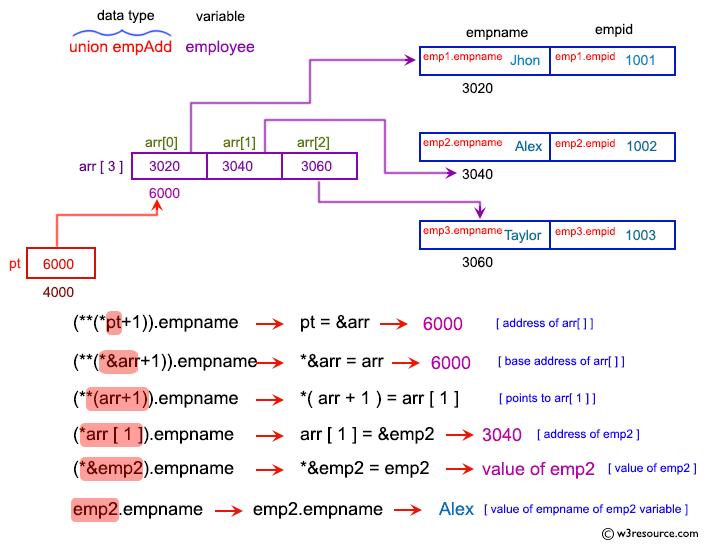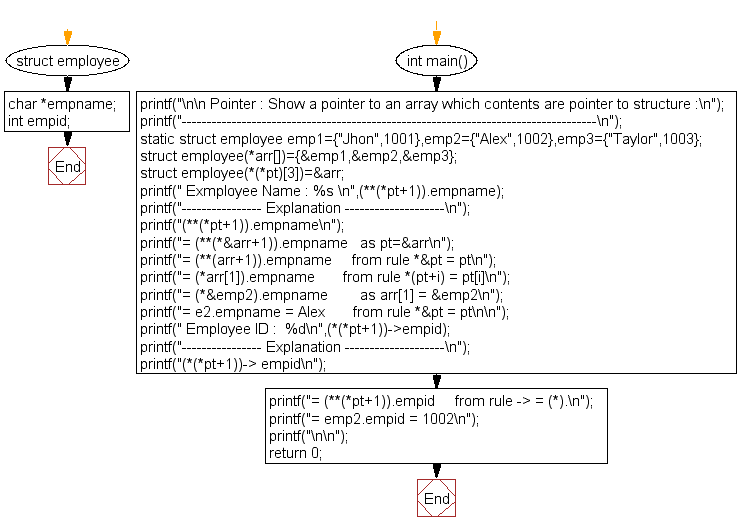C Exercises: Show a pointer to an array which contents are pointer to structure
C Pointer : Exercise-20 with Solution
Write a program in C to show a pointer to an array which contents are pointer to structure.
Pictorial Presentation:

Sample Solution:
C Code:
#include <stdio.h>
struct employee
{
char *empname;
int empid;
};
int main()
{
printf("\n\n Pointer : Show a pointer to an array which contents are pointer to structure :\n");
printf("-----------------------------------------------------------------------------------\n");
static struct employee emp1={"Jhon",1001},emp2={"Alex",1002},emp3={"Taylor",1003};
struct employee(*arr[])={&emp1,&emp2,&emp3};
struct employee(*(*pt)[3])=&arr;
printf(" Exmployee Name : %s \n",(**(*pt+1)).empname);
printf("---------------- Explanation --------------------\n");
printf("(**(*pt+1)).empname\n");
printf("= (**(*&arr+1)).empname as pt=&arr\n");
printf("= (**(arr+1)).empname from rule *&pt = pt\n");
printf("= (*arr[1]).empname from rule *(pt+i) = pt[i]\n");
printf("= (*&emp2).empname as arr[1] = &emp2\n");
printf("= emp2.empname = Alex from rule *&pt = pt\n\n");
printf(" Employee ID : %d\n",(*(*pt+1))->empid);
printf("---------------- Explanation --------------------\n");
printf("(*(*pt+1))-> empid\n");
printf("= (**(*pt+1)).empid from rule -> = (*).\n");
printf("= emp2.empid = 1002\n");
printf("\n\n");
return 0;
}
Sample Output:
Pointer : Show a pointer to an array which contents are pointer to structure :
-----------------------------------------------------------------------------------
Exmployee Name : Alex
---------------- Explanation --------------------
(**(*pt+1)).empname
= (**(*&arr+1)).empname as pt=&arr
= (**(arr+1)).empname from rule *&pt = pt
= (*arr[1]).empname from rule *(pt+i) = pt[i]
= (*&emp2).empname as arr[1] = &emp2
= emp2.empname = Alex from rule *&pt = pt
Employee ID : 1002
---------------- Explanation --------------------
(*(*pt+1))-> empid
= (**(*pt+1)).empid from rule -> = (*).
= emp2.empid = 1002
Flowchart:

C Programming Code Editor:
Have another way to solve this solution? Contribute your code (and comments) through Disqus.
Previous:> Write a program in C to show a pointer to union.
Next: Write a program in C to print all the alphabets using pointer.
What is the difficulty level of this exercise?
Test your Programming skills with w3resource's quiz.
C Programming: Tips of the Day
Static variable inside of a function in C
The scope of variable is where the variable name can be seen. Here, x is visible only inside function foo().
The lifetime of a variable is the period over which it exists. If x were defined without the keyword static, the lifetime would be from the entry into foo() to the return from foo(); so it would be re-initialized to 5 on every call.
The keyword static acts to extend the lifetime of a variable to the lifetime of the programme; e.g. initialization occurs once and once only and then the variable retains its value - whatever it has come to be - over all future calls to foo().
Ref : https://bit.ly/3fOq7XP
- New Content published on w3resource:
- HTML-CSS Practical: Exercises, Practice, Solution
- Java Regular Expression: Exercises, Practice, Solution
- Scala Programming Exercises, Practice, Solution
- Python Itertools exercises
- Python Numpy exercises
- Python GeoPy Package exercises
- Python Pandas exercises
- Python nltk exercises
- Python BeautifulSoup exercises
- Form Template
- Composer - PHP Package Manager
- PHPUnit - PHP Testing
- Laravel - PHP Framework
- Angular - JavaScript Framework
- Vue - JavaScript Framework
- Jest - JavaScript Testing Framework
